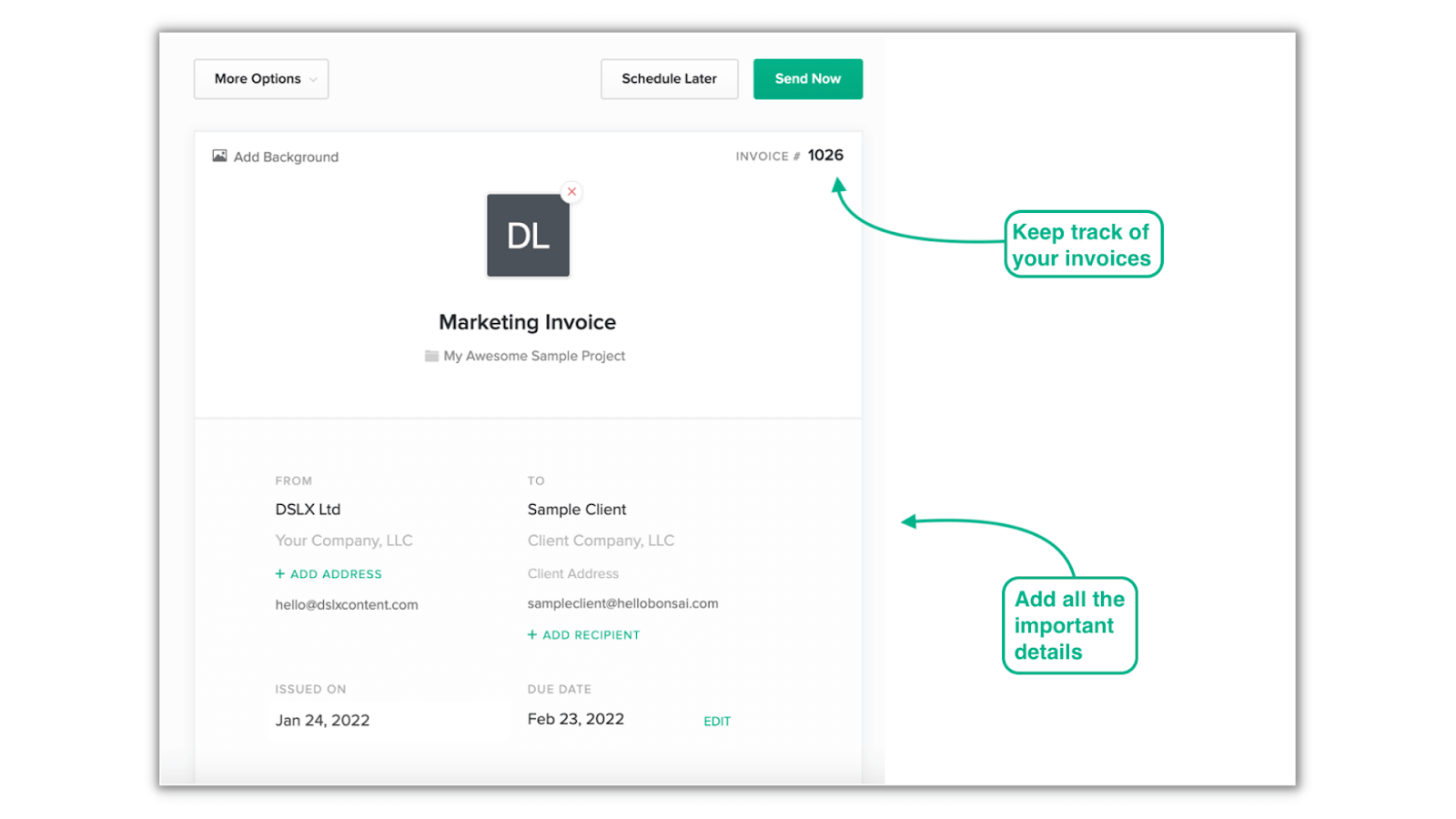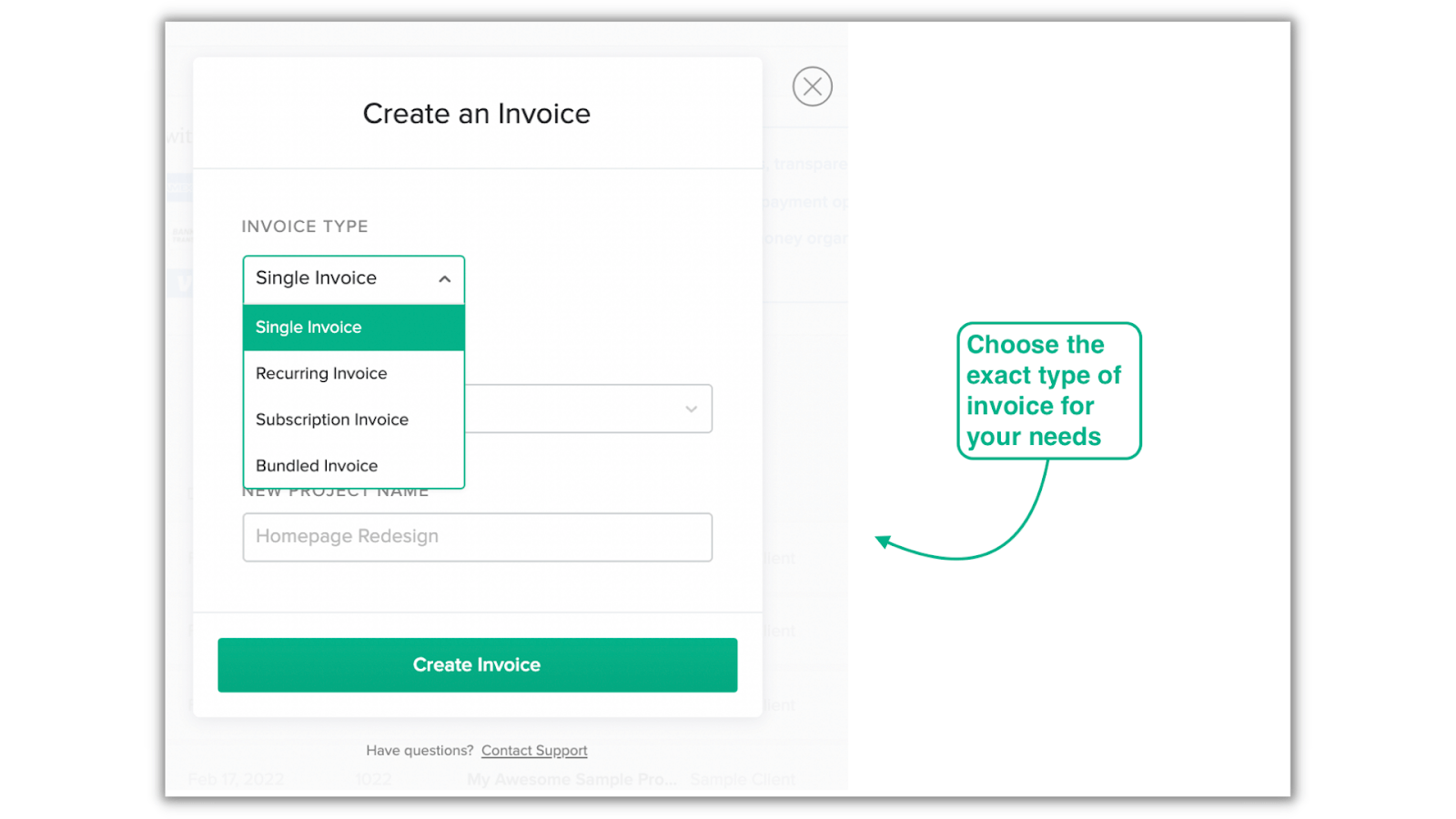What is a Marketing Invoice?
A marketing invoice is a document outlining the breakdown of payments due following a marketing project. This invoicing document lists all the marketing services you’ve provided within the agreed project scope, along with the pricing for each service.
Perhaps this might be working on spicing up your clients’ social media presence or building their authority through thought leadership blog content—the spectrum of marketing services is pretty vast.
Before starting any new project, you’ll likely want to share a proposal and contract with your client to get the ball rolling. These documents—especially the legally-binding contract—spell out the agreed scope of work for every project and contain the final pricing for every service.
So, when the time comes to invoice your client, it’s easy to check back on what was initially agreed.
Although you’ve got all the info you need, making invoices manually for every client, every month, can get tedious. Creating these documents from scratch for every new project is a waste of your time.
With a marketing invoice template, you can avoid the hassle. A template gives you the basic foundations of an invoice—all you have to do is fill in the project-specific details.
Note: Sign up to Bonsai today to start creating your marketing invoice, and join the 500,000+ freelancers and SMBs already streamlining their business processes with Bonsai.
What to Include in the Marketing Invoice

If you’re new to invoicing, this might seem daunting—your pay depends on your invoice, after all. Don’t fret, once you get the hang of it and draft up a detailed marketing invoice template, invoicing quickly becomes child’s play.
Let’s look at those essential elements for a perfect marketing invoice template:
Overview
The first section of your invoice should cover all the necessary details about you and your client. This can include your name, contact details, and address and your client’s business name, contact, address, and billing information. You can add any additional information, like sales tax details, as well.
Your invoice should also include the issue date, payment date, and invoice number. This part is important for the sake of keeping everyone’s records tax-ready and helps with receiving your payment on time.
List of services
Right after the overview, you can jump into the nitty-gritty of your marketing invoice—the items you’re billing for. This is naturally the most important part of your invoice template since this section itemizes every service you’ve completed within the project scope.
The best way to list down your services is in a simple table. This neatly organizes all the points of information, such as:
- Services contracted
- Charges for each service
- Any tax inclusions
- Any comments
- Total price
Bonsai Top Tip: To make things easy for both you and your clients, include a brief description of the items you’re charging for in your invoice template. The easier this breakdown is to understand, the quicker your client can pay you.
Remember, invoicing is a part of the overall client experience with you and your business. Keep delivering smooth experiences and make your clients job that much more joyful.
Subtotal
Once you’ve listed down all the services, the next section of your invoice sums up the total price of the project. Carefully calculate the sum of all the inclusions—don’t forget to double-check this part before sending the invoice across if you don’t have a tool that automatically does it for you—ahem, Bonsai.
A payment due date on your invoice will help ensure you’re paid on time.
Bonsai Top Tip: It’s also best to include a clause for late payments in your marketing contract to add more weight to this due date.
Payment terms

You’re now at the final part of your marketing invoice template—your payment terms and policies.
Your invoice should include a list of all accepted payment methods—your bank transfer details, PayPal ID, or any other payment details. More flexibility when it comes to payment options can improve your client’s experience.
The last step to wrap up your invoice creation process is a quality assurance check. Proofread your document and check for any errors before sending it your client’s way. Until the document ticks all the correct boxes your client has the grounds to reject it.
Bonsai top tip: Include a thank you note for your customers to convey your gratitude. This helps in adding a touch of personalization and delivers a better positive impact.
How to Write a Marketing Invoice
Before you dive right in, let’s explore some tried-and-tested tips to create the perfect template.
Here’s a set of best practices to draft stellar templates for your marketing services:
Build trust with professionalism
Digital marketing invoices play a crucial role in building a client’s trust in their service provider. If the invoice design isn’t up to scratch, your brand value will drop in the eyes of the client.
Before you start drafting your invoice, come up with a professional layout. Instead of simply putting together all the details in a plain document, create an elegant invoice template that highlights your creativity and aligns with your branding.
A well-structured invoice template goes a long way in building a client’s confidence in your services and creating a lasting impression for your marketing business.
Be clear and descriptive
Contrary to popular belief, invoices aren’t just rundowns of the services rendered to the clients. A professional invoice clearly itemizes all marketing services and defines each service so client’s know what they’re paying for.
Create a marketing invoice template with the goal of being as clear as possible. Make sure to highlight the subtotal and draw attention to the payment method—this way everything’s super clear.
Organize the details
Hopefully, you’re sending quite a few invoices each month. Even if you’re new to the game, you need a digital marketing invoice for every official project you complete.
It’s easy to get confused—especially when trying to organize everything yourself via Google docs, so make sure you’ve got a solid organization structure if you’re handling invoices out of an invoice management tool.
Plus, you need to organize all the information properly in your marketing invoice template. Whether it’s the unique invoice number, client details, or invoice date—make sure everything has its home in your invoice template. The invoice number is particularly important to track a status, send payment reminders, and add late fees.
Add a personal touch
Besides getting you the payment you deserve for all your work, an invoice can also end up being the final touch point with your client.
You can customize your invoice templates with a small personal note at the end, thanking your client for their trust in your business. This is also a great place to encourage a repeat purchase with a discount coupon or note for hope of continued work.
Creating a Marketing Invoice is Simple with Bonsai

Designing your own digital marketing invoice template is no small feat. Factoring in so many elements and piecing it all together into a professional design isn’t exactly riveting, but it is necessary.
Leave it to Bonsai’s marketing invoice template to do the heavy lifting for you. These expertly curated invoice templates have everything you need to include in your invoices. Plus, it’s super simple to get started:
- Sign up to Bonsai for free
- Choose a free invoice template that matches your style
- Customize and modify it for every client
Working with Bonsai is simple and efficient. Browse through hundreds of templates for proposals, contracts, invoices, and more to simplify and streamline all the documentation for your business.
Marketing Invoice FAQs
What is an invoice in marketing?
A marketing invoice is a document itemizing the services offered by a business or freelancer to their client. This dated document includes a detailed record of each service completed within a given time span and the total amount to be paid.
Besides a rundown of these services, it also includes details about the client’s business and billing information.
How do I write a marketing invoice?
Creating a marketing invoice is easy when you follow these tips:
- Build trust with a professional design
- Be clear and descriptive
- Stay organized
- Add a personal touch
Keep you and your client’s interests in mind when drafting any invoice. The task is a lot easier when you have a digital marketing invoice template—try a template from Bonsai today.





